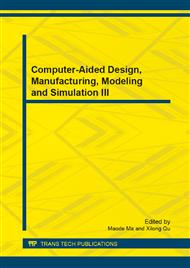[1]
Yinghai Li. Cascade Hydropower Stations Joint Optimal Dispatch and Decision-making Method [D]. Huazhong University of Science and Technology, (2009).
Google Scholar
[2]
Yingjie Lei, Shanwen Zhang, Xuwu Li et al. Genetic Algorithm Toolbox of MATLAB and Its Application. Xi'an Electronic and Science University Press, 2005. (in Chinese).
Google Scholar
[3]
East, V. and M. J. Hall, Water Resource System of Optimization Using Genetic Algorithms, Proceeding of the First International Conference on Hydroinformatics, Balkema, (1994).
Google Scholar
[4]
Huang Wen-Cheng, Yuan Lun-Chin, Lee Chi-Ming. Lining Genetic Algorithms With Stochastic Dynamic Programming to the Long-term Operation of a Multi-reservoir System. Water Resources Research, 2002, 38(12): 41-49.
DOI: 10.1029/2001wr001122
Google Scholar
[5]
Akter, Taslima, Simonovic, Slobodan P. Modeling Uncertainties in Short-term Reservoir Operation Using Fuzzy Sets and a Genetic Algorithm Association[J]. Hydrology Sciences Journal, 2004, 49(6): 1081-1098.
DOI: 10.1623/hysj.49.6.1081.55722
Google Scholar
[6]
John E Hunt. Learning Using an Artificial Immune System [J]. Journal of Network and Computer Applications, 1996, 19(1): 189-212.
Google Scholar
[7]
Jianjun Ni, Lizhong Xu, Chenming Li et al. Some Advances in Research of Reservoir Operation and Decision-making [J]. Advances in Science and Technology of Water Resources, 2004, 24 (6): 63-66. (in Chinese).
Google Scholar
[8]
Ke Xu, Jianzhong Zhou, Ran Gu. Eco-environment Effect-oriented Cascade Reservoir Operation [J]. Journal of Huazhong University of Science and Technology (NATURAL SCIENCE EDITION), 2010, (10): 119-123. (in Chinese).
Google Scholar
[9]
Richter BD. A Method for Assessing Hydrologic Alteration Within Ecosystems [J]. Conserve Biol 1996, (10) 1163-1174.
Google Scholar
[10]
Richter B D. How Much Water Does a River Need? [J] Freshwater Biology, 1997, 37(1): 231-249.
DOI: 10.1046/j.1365-2427.1997.00153.x
Google Scholar
[11]
Chang Shu, Suxia Liu, Xingguo Mo et al. Estimation of Instream Ecological Flow Based on RVA [J]. Ecology and Environmental Sciences, 2010, (05): 1151-1155. (in Chinese).
Google Scholar
[12]
Tharme R.E. A Global Perspective on Environmental Flow Assessment: Emerging Trends in the Development and Application of Environmental Flow Methodologies for Rivers [J]. River Research and Application, 2003, (19): 397-441.
DOI: 10.1002/rra.736
Google Scholar
[13]
Lanlan Song, Guihua Lu, Ling liu. Estimation of Instream Flow Based on Hydrological Indexes [J]. SHUILI XUEBAO, 2006, 37(11): 1336-1341. (in Chinese).
Google Scholar
[14]
Wengong Yu. Research on Measurement and Scheme of Ecology Runoff Scheduling for Three Gorge Project [D]. Hohai University, 2007. (in Chinese).
Google Scholar
[15]
Mengxian Sun. The Research of Improved Immune Genetic Algorithm for Function Optimization [D]. Soochow University, 2010. (in Chinese).
Google Scholar


